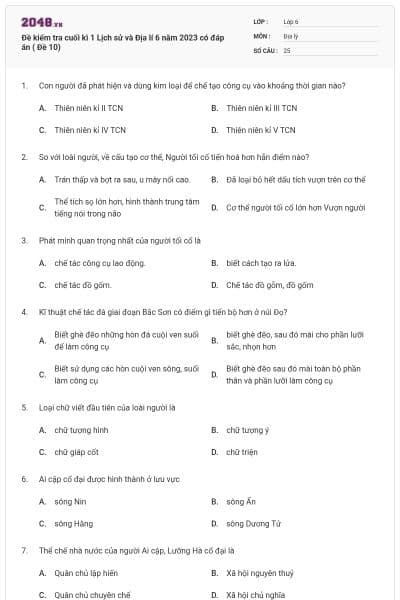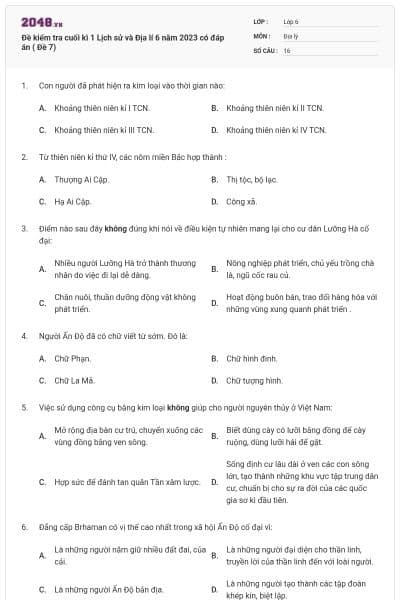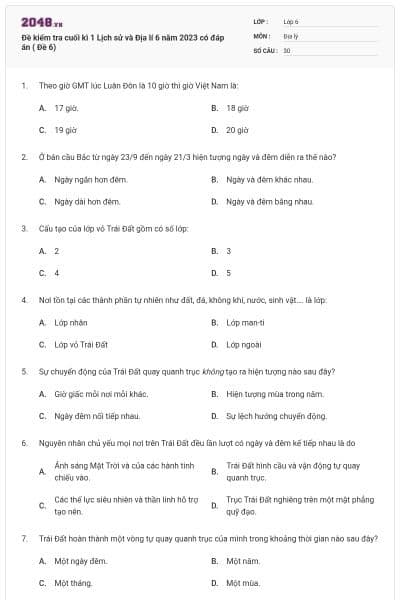Đề kiểm tra cuối kì 1 Lịch sử và Địa lí 6 năm 2023 có đáp án ( Đề 13)
19 câu hỏi
Tư liệu chữ viết là
những hình khắc trên bia đá.
những bản ghi; sách được in, khắc bằng chữ viết, vở chép tay…
những hình vẽ trên vách đá, hang động
những câu truyện cổ tích được kể lại
Công lịch quy ước
Một thập kỷ là 10 năm.
Một thập kỷ là 100 năm.
Một thập kỷ là 1000 năm.
Một thập kỷ là 1 năm.
Loài người là kết quả của quá trình tiến hóa từ
Người tối cổ.
Người tinh khôn.
Vượn cổ.
Vượn người.
Đạo Phật xuất hiện ở Ấn Độ vào thời gian nào?
Thế kỉ VI TCN
Thế kỉ IV
Thế kỉ VI
Thế kỉ VII
So với loài Vượn người, Người tối cổ tiến hóa hơn hẳn điểm nào?
Trán thấp, đầu nhỏ, u mày nổi cao.
Thể tích sọ lớn hơn, hình thành trung tâm phát tiếng nói trong não.
Đã loại bỏ hết dấu tích vượn trên cơ thể.
Cơ thể Người tối cổ lớn hơn vượn người.
Lịch ra đời sớm ở Ai Cập và Lưỡng Hà vì yêu cầu gì?
Phục vụ sản xuất nông nghiệp.
Phục vụ việc chiêm tinh, bói toán.
Phục vụ yêu cầu học tập.
Thống nhất các ngày tế lễ trong cả nước
Theo quy ước, đầu bên phải của vĩ tuyến là hướng Đông, đầu bên trái là hướng
Bắc.
Nam.
Đông.
Tây.
Nửa đường tròn nối 2 cực trên bề mặt quả Địa Cầu được gọi là
vĩ tuyến.
vĩ tuyến gốc.
kinh tuyến.
kinh tuyến gốc.
Cấu tạo bên trong của Trái Đất gồm mấy lớp?
1.
2.
3.
4.
Trên Trái Đất có bao nhiêu dạng địa hình chính nào
3.
4.
2
1
Nguyên nhân sinh ra hiện tượng các mùa là do Trái Đất
có dạng hình cầu, trục nghiêng và không đổi hướng trong khi chuyển động.
chuyển động tịnh tiến quanh Mặt Trời.
có dạng hình cầu.
tự chuyển động quanh trục.
Phương án nào sau đây không phải là hệ quả của sự vận động tự quay quanh trục của Trái Đất?
Ngày và đêm kế tiếp nhau.
Sự lệch hướng chuyển động của các vật thể.
24 khu vực giờ trên Trái Đất.
Hiện tượng ngày đêm dài ngắn theo mùa
Em hãy nêu các cách tính thời gian trong lịch sử ? Muốn biết năm 2000 TCN cách năm hiện tại ( năm 2021) bao nhiêu năm thì em sẽ tính như thế nào ?
Đời sống vật chất, tinh thần và tổ chức xã hội của Người tinh khôn có những điểm nào tiến bộ hơn so với Người tối cổ?
Trình bày những thành tự văn hóa tiêu biểu của Ai Cập cổ đại?
Lớp vỏ khí gồm mấy tầng? nêu đặc điểm của tầng đối lưu?
Vì sao có hiện tượng ngày và đêm kế tiếp nhau ở khắp mọi nơi trên Trái Đất?
Hai địa điểm có khoảng cách thực tế là 25km, thì trên bản đồ có tỉ lệ là 1:500000, khoảng cách giữa hai địa điểm đó là bao nhiêu?
Đêm gala nghệ thuật sắc màu văn hóa bốn phương được truyền hình trực tiếp vào 21 giờ ngày 29/03/2018 tại Việt Nam. Vậy khi đó ở Hàn Quốc là mấy giờ (cho biết VN thuộc múi giờ số 7, Hàn Quốc thuộc múi giờ số 9)?








